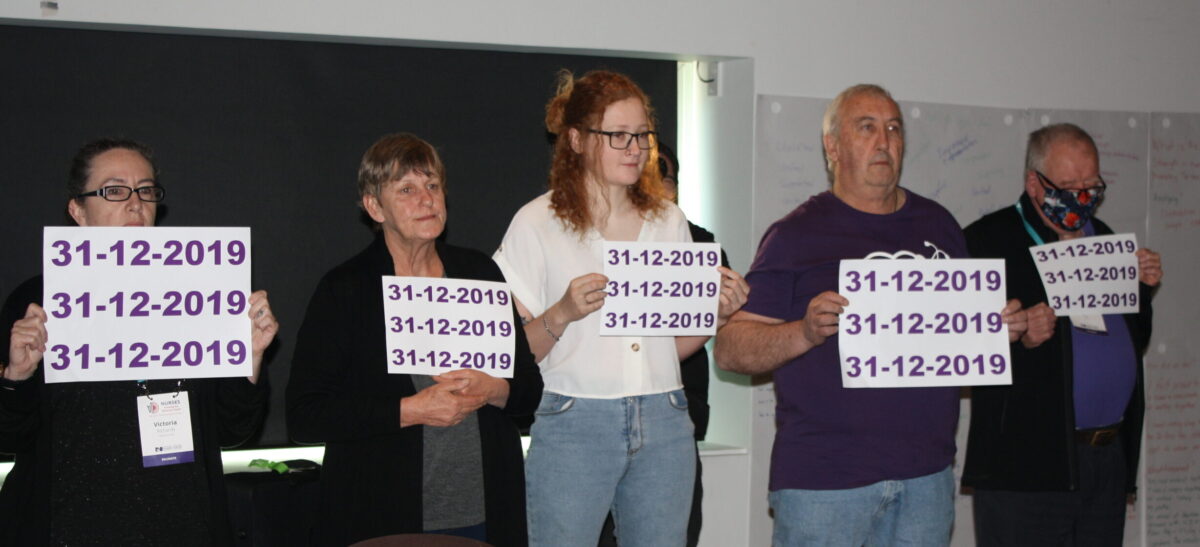When Minister of Health Andrew Little took to the podium at NZNO’s conference a group of five members made their own point, silently holding signs at the back of the room.
Printed in purple, each sign held by members from the NZNO Central Regional Council simply stated the start date for back pay, as agreed in the pay equity claim: “31.12.2019”.
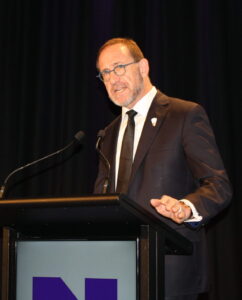
NZNO nurse Grant Cloughley, who was on the bargaining team, said the protest was “a polite reminder to the minister of the DHB promise to pay back pay to 31st of December 2019, since he reneged on it”.
Cloughley said the promised back pay was used as “leverage” in getting NZNO members to agree to the last pay deal – and now what was actually happening was “completely different” than what had been promised.
Members were “really pissed off” about it and would not be backing down, he said.
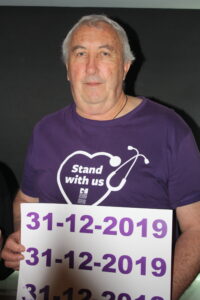
He predicted it would be mid-2023 before it was decided on by the Employment Court.
It’s unclear if the minister saw the protest, but he didn’t shy away from the topic completely.
“I want to acknowledge the NZNO and the Government are in a significant disagreement over the pay equity claim.”
Little said the dispute would not be resolved quickly, and he expected it to take more than one year.
While he could not comment on the matter as it was before the court, he hoped “any opportunity that might arise to discuss the issues and resolve them through mutual agreement is taken”.
‘Brave’ minister turns up
One member, who did not want to be named, said they thought the minister was “brave” to accept the invitation to speak on the final day of the annual conference. However, the member also said; “I thought his speech really avoided a lot of what we wanted to hear.”
Following the minister’s speech, he addressed a summary of questions from conference delegates.
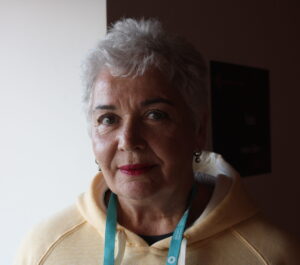
Primary health nurse Denise Moore said she was disappointed not to have an opportunity to speak directly to the minister.
“I think we can get our point across, we don’t have to get angry about it, he can tell by the questions we’re putting to him how upset we are.”
She said her question about pay parity for primary health nurses was not answered by the minister.
“He said it was at the forefront of his mind, but he didn’t really come back with an answer.”
‘Extraordinary pressure’ on nurses
Little acknowledged “the extraordinary pressure our response to the COVID-19 pandemic has put on nurses”.
He said a July survey of members and their comments made “sobering reading”.
Asked if the Government would offer free student fees for nursing, the minister all but ruled it out.
“I don’t anticipate we will providing fees free to nurses or any other health group very shortly, so that’s just the reality. We supply what support we can to nursing students.”
Little said the Government had introduced a fees-free policy for all first-year tertiary students in 2018, and he had recently announced measures to support some students with particular study and placement costs. Further work to support students on placements was underway, he said.
“I’ve talked to student nurses – and I know about the particular burden of financial costs so we want to focus on that.”
He was confident Te Whatu Ora was working to build the nursing workforce.
A “single desk” for health recruitment would be functioning from next month, he said.
“We cannot do everything that everyone would like in all circumstances.”
Overseas qualified nurses have played a vital role, but this alone was not sustainable, which was why increasing the domestic training and recruitment pipeline was important, Little said.
He summarised recent action taken by the Government including an expansion of a “return to nursing fund”; doubling the number of places for nurse practitioners (from 50 to 100 by June 2024); and increasing new-entry specialist places, bursaries and scholarships.
Little said the Government’s recent immigration changes had made it easier for overseas trained nurses to work here. “The facts are we made it much easier for nurses to come to New Zealand.”
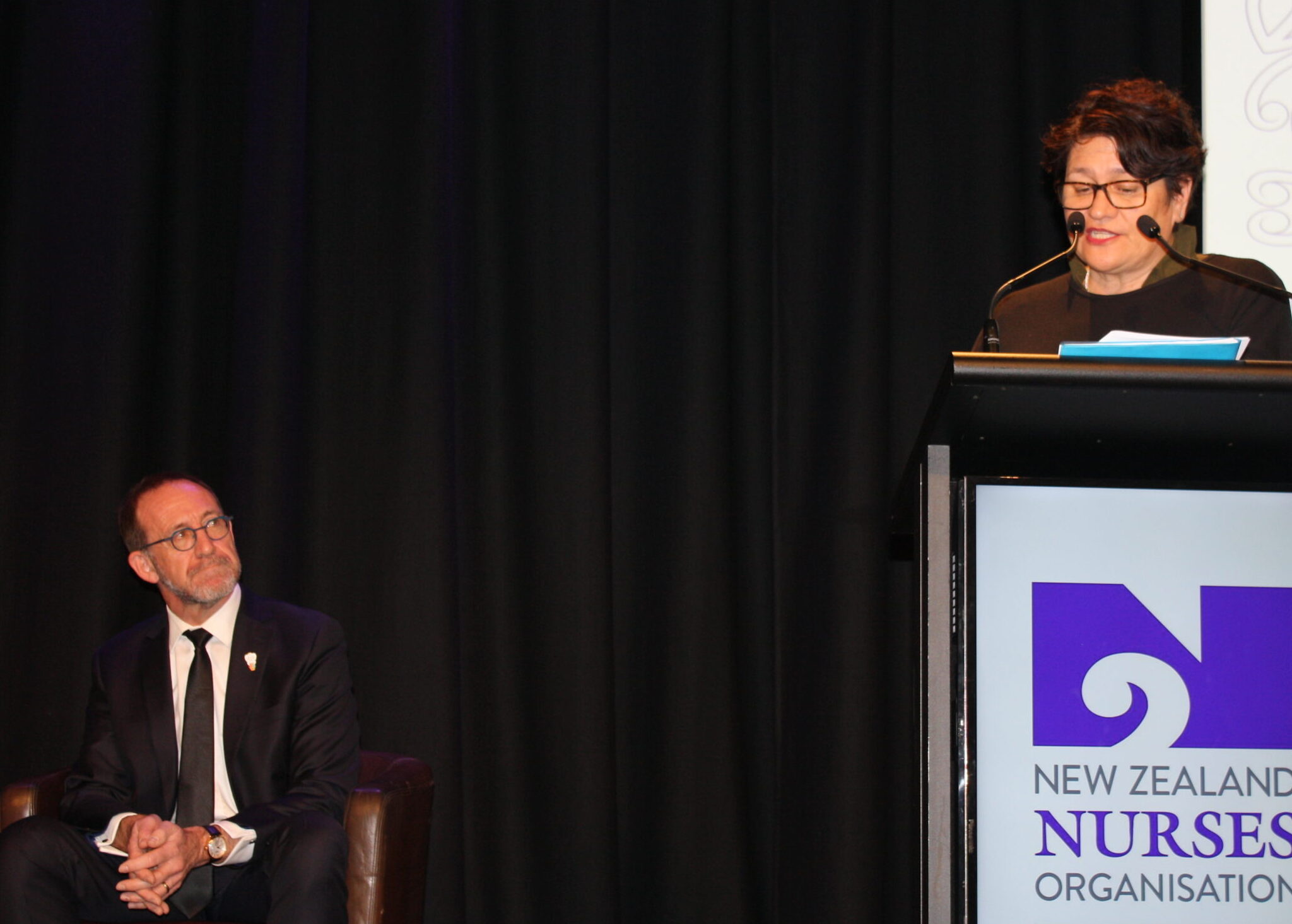
The changes, announced in May this year, were roundly criticised for not offering overseas trained nurses immediate residency, like other professions including medical specialists.
Little said work underway by Te Whatu Ora to build the New Zealand-trained workforce was focused on reducing attrition rates among nursing students, developing a nationally consistent education pathway, and improving access to clinical placements.
He said NZNO’s involvement in health system decisions and changes within a limited budget, was vital.
“We cannot do everything that everyone would like in all circumstances.”
The Government had increased health budgets but there were limits, he said.
“Doing more of the same won’t be good enough, your voice needs to be there – not to resist change but to shape it.”
Kaiwhakahaere Kerri Nuku thanked the minister for his message that “the voices of frontline workers. . . and students is really critical.
“Unfortunately, we’ve felt the voices of nurses in this crisis have not been heard.”
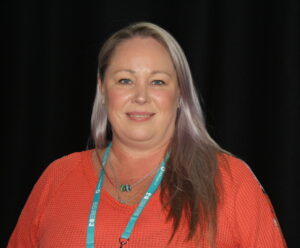
NZNO College of Gerontology Nurses chair Natalie Seymour said the minister “didn’t say anything we haven’t heard before and we still haven’t seen action”.
Aged care was losing staff, forcing the closure of beds and rest homes.
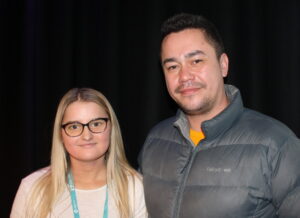
“The last 18-24 months have been horrendous for the aged care sector,” Seymour said. “There is no end in sight.”
NZNO student leaders Manu Reiri and Rebecca Dunn said they were keen to meet Little to discuss plans to better help students on placement.
“Any supports he’s looking at should be done in consultation with students.”


